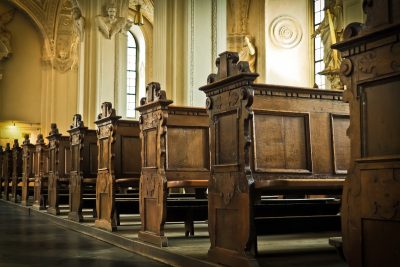
By Cian Molloy - 09 March, 2020

Pews sit empty as religious services are suspended in Northern Italy.
All religious ceremonies, including Masses, weddings and funerals, have been suspended in Northern Italy as the Italian government imposes quarantine measures on 16 million of its people to help prevent the spread of the Covid-19 coronavirus.
With nearly 6,000 infections and more than 230 deaths, Italy is experiencing the biggest outbreak of the virus in Europe and the largest number of Covid-19 fatalities. Worldwide, some 100,000 people have been infected by the virus and more than 3,500 have died, mainly from respiratory difficulties.
In Italy, the health services are struggling to cope with growing numbers of seriously ill people, and the Italian government hopes that imposing travel restrictions and other measures will help reduce the pace of the epidemic’s spread. In Lombardy, and 14 other provinces, people need official permission to leave the region.
In these provinces, schools, universities, theatres, cinemas and nightclubs have been closed. All religious ceremonies have been halted, including funerals. The restrictions affect a quarter of Italy’s population.
Meanwhile, in St Peter’s Square in Rome, Pope Francis conducted Sunday’s midday Angelus via a video link from the library of the Apostolic Palace. The decision for the pope not to appear at his balcony overlooking St Peter’s Square meant there was a reduced need for security measures, so there were fewer occasions where pilgrims had to pass through congested security checks at entrances to the square.
During his address, the pope prayed for all those affected by the coronavirus outbreak, saying: “I unite myself to my brother Bishops in encouraging the faithful to live this difficult moment with the strength of the faith, the certainty of hope and the ardour of charity.”
Across the world, various dioceses and parishes have introduced measures, such as not shaking hands when making the Sign of Peace at Mass, to help prevent the spread of the virus. In Lancaster Diocese in the north of England, Bishop Paul Swarbrick has banned the use of hymnals and shared Mass books during the outbreak period. He has called for the use of single-use disposable hymn sheets where congregations need help remembering lyrics.